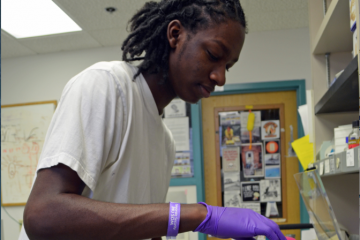Johns Hopkins is expanding its annual institution-wide Summer Jobs Program, which gives Baltimore City youth between the ages of 15 and 21 a chance to experience various careers while getting a taste of workplace culture.
This year, the university, hospital, and health system are gearing up to employ 300 students—100 more than last summer—over the course of two summer work sessions, starting June 22 and July 27.
This year's cohort is the largest in the 21-year history of the Summer Jobs Program, which was able to expand because faculty and staff quickly stepped up to provide additional paid internships for the city's young people. An email message sent Wednesday afternoon by Johns Hopkins leaders urged faculty and staff to identify opportunities within their departments where young people could gain job skills and a meaningful educational and mentoring experience. By Thursday afternoon, all but a handful of placements were made.
In a message to faculty and staff, Ronald J. Daniels, president of Johns Hopkins University; Ronald R. Peterson, president of the Johns Hopkins Hospital and Health System and executive vice president of Johns Hopkins Medicine; Paul B. Rothman, dean of the Johns Hopkins University School of Medicine and CEO of Johns Hopkins Medicine, wrote about how they had engaged in many conversations about the ways Johns Hopkins could support its neighbors in the wake of the recent unrest in Baltimore.
"Out of these discussions and your many thoughtful suggestions, we found that employment—specifically, job opportunities and career tracks for youth—was a recurring theme," they wrote.
Peterson was on hand Wednesday as a number of government and business leaders—including Baltimore Mayor Stephanie Rawlings-Blake, U.S. Labor Secretary Tom Perez, and Sen. Barbara A. Mikulski—urged employers to help close a funding gap for Baltimore's summer jobs program. That program, YouthWorks, needs $1.5 million in additional funding to achieve a goal of hiring all of the nearly 8,000 young people who have applied.
Johns Hopkins, which partners with the city program, was asked to increase its placements by 50 percent, from 200 to 300, and was able to meet that goal with coordination by the Office of Strategic Workforce Planning & Development. Over the years, Johns Hopkins has served more than 2,500 students through the program, providing them with work experience and skills that may be used in future jobs.
Posted in University News, Community
Tagged community








